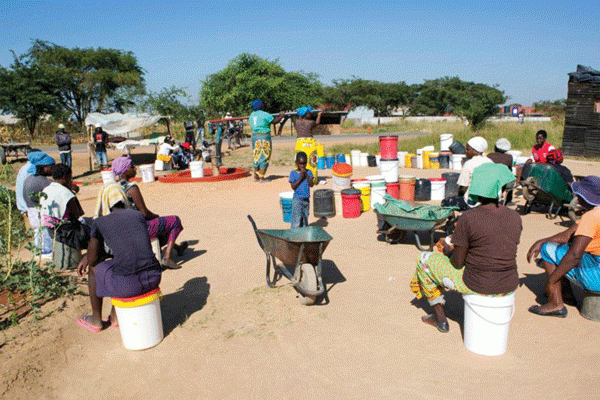
THE Office of the Auditor-General (OAG) plays a crucial role in the public sector by periodically publishing audit reports.
These reports serve as a vital evaluation tool for internal control mechanisms, stimulating good governance and enhancing efficiency, transparency, and accountability in the management of public funds.
This column, therefore, aims to provide a concise analysis of the latest OAG report on local authorities for the financial year ended December 31 2022. The analysis will offer context, key audit findings, and an outline of socio-economic implications.
Key highlights
Most local authorities had modified audit opinions (25% qualified and 67% adverse) for the audited years (2018-2022) mainly due to non-compliance with International Public Sector Accounting Standards and International Financial Reporting Standards.
Most findings in local authorities remain regarding financial mismanagement, non-compliance with international accounting standards and laws and regulations, untaxed benefits, lack of adequate controls over contract management and management of stands sales, and poor service delivery.
Governance issues dominated audit findings, increasing from 91 issues in 2021 to 139 in 2022. The same has remained high in all reports submitted over the last five years.
There was a sharp increase in revenue collection and debt recovery issues from 11 to 101 between 2021 and 2022 due to weak internal controls in revenue collection and debt recovery.
- Sakunda hail SA stadia tour
- Rufaro Stadium refurb gathers momentum
- Huge incentives for DeMbare, Bosso
- Chiri vows to stop looting
Keep Reading
The number of reported procurement issues increased from 11 in 2021 to 41 in 2022, indicating weakening procurement management systems and non-compliance with procurement laws and regulations by local authorities.
Service delivery issues have also been rising over the years. The OAG reported 33 issues in 2021 and 41 issues in 2022. The existing infrastructure in local authorities is lagging in meeting the growing demand for services. There are backlogs in constructing new infrastructure and maintaining the existing facilities.
Implications
The OAG performance audit reports assure service delivery as they respond directly to citizens' bill of rights and social rights, such as access to affordable and quality health care, housing, clean and safe water, education, transportation, and social security.
Access to education: The latest OAG report on local authorities has laid bare the challenges faced in the public education sector, which sustains most of the learning population. Investments into the education sector by local authorities to increase education infrastructure, such as classroom blocks, are inadequate, leading to hot seatings. For instance, 2022 enrolment statistics for a school in Redcliff Municipality show that there were 47 classes against the available 17 classrooms; hence, the school required an additional 30 classrooms to alleviate the shortage. Also, the Ruwa Local Board (RLB) had only six primary and three secondary schools to serve its growing population.
Many public schools, particularly in urban areas, operate on hot seating arrangements to accommodate learners needing affordable public education. The private sector has primarily dollarised, yet many households earn in local currency, which is highly volatile.
These classroom shortages are causing many learners to attend lessons outside classrooms and be exposed to extreme weather conditions.
The available classrooms are overcrowded. This limits resources available for learning, disadvantages children with additional needs, reduces teachers’ ability to give individual feedback, and increases distraction, which affects focus and concentration.
So, the lack of investment in public education by local authorities is entrenching inequalities and trapping many people in vicious cycles of poverty.
Healthcare access
Local authorities are expected to provide residents with affordable, state-of-the-art healthcare infrastructure and services. These are crucial as they allow citizens to realise their potential and play an essential role in social and national development. From an economic perspective, a healthy population helps build a productive workforce and strengthens the country in many economic spheres.
However, the OAG report has shown that many local authorities fail to provide residents with adequate healthcare services. For instance, clinics in Kadoma City Council operate with a shortage of registered general nurses and sisters in charge and have no functional ambulances.
The OAG report established that as of 2019, Karoi Town Council had only one clinic (Chikangwe Clinic) to serve the whole town. In addition, there was no running tap water at Chikangwe Clinic.
Zvishavane Town Council does not have any clinic or hospital; thus, it relies on one district hospital and government clinic. These facilities were inadequate to cater to the district’s population of approximately 33 075.
Dilapidating infrastructure, poor remuneration, and a shortage of medical drugs, medical equipment, and healthcare personnel in council-owned healthcare institutions are increasing residents' costs in the form of higher out-of-pocket costs, higher insurance premiums, and increased drug prices.
This is also leading to increased avoidable deaths due to limited rapid response mechanisms and postponement of medical procedures. Housing access
Local Authorities are mandated to provide housing to residents. As such, they are expected to develop and maintain up-to-date plans that meet the housing requirements of their communities, decide development applications promptly, and ensure the homes they have planned for are built on time.
This is key to reducing poverty, ensuring households can afford housing, and reducing illegal settlements and homelessness.
Nevertheless, the OAG report showed that many local authorities fail to take their housing responsibility seriously. The audit report established that some local authorities, like Chegutu Municipality, lack proper controls of stand registers to avoid manipulation, while others, like Gweru City Council, do not maintain stand registers at all. Some, like Harare City Council, sell unserviced stands.
The lack of effective housing policies, coupled with the sale of unserviced stands, is leading to housing shortages and illegal settlements, which fuel the spread of diseases and the crime rate.
Water access
Water is a critical resource that is key to life on e+arth. To show its importance, the constitution makes access to clean, safe, and potable water a right for every Zimbabwean.
As such, the failure to provide water to citizens by authorities is an apparent disregard for the supreme law of the land. Surprisingly, many urban and rural communities have not had access to clean water for decades.
The audit report has indicated that many local authorities are to blame for residents' severe water challenges, particularly in urban areas.
These local authorities fail to expand water infrastructure, repair broken pumps and meters, replace aging water distribution networks, and curtail illegal connections and vandalism.
For instance, 70%, 43%, and 21% of water meters in Ruwa RDC, Mutare City Council, and Chinhoyi Municipality were dysfunctional. Yet, the use of estimates when billing customers leads to below-cost pricing.
Also, the Victoria Falls City Council had no water reservoirs and could not provide residents with alternatives during emergencies like power cuts and plant breakdowns.
These shortages of clean and safe water across many local authorities are increasing the opportunity cost of unpaid care work, such as lost hours of schooling for young girls. It is also leading to the spread of medieval diseases like cholera and typhoid.
Sanitation, social amenities access
Zimbabwe remains a significant country in the Southern African Development Community (Sadc) region, struggling with repeated outbreaks of medieval diseases like cholera, an exception for the 21st century.
These are results of the under-provision of sanitation services by local authorities as investment in infrastructure is being outpaced by the rising urban population.
Citizens are flocking in droves from rural to urban areas for greener pastures.
The OAG report established that many local authorities are battling sewer blockages along the sewer network due to the continued use of aged pipes, erratic power supply, and outdated sewer designs.
The communities also struggle with sewer spillages, causing raw effluent to flow into water sources. Refuse is not being collected consistently, leading to the mushrooming of dumpsites near residential areas, particularly in high-density suburbs.
More so, local authorities are not maintaining sewer plants, which pose life-threatening hazards. For instance, the OAG report highlighted that the failure to fence a disused sewer plant by Redcliff Municipality led to the death of a minor.
Environmental protection
Climate change has become an existential threat to human life. Averting the danger and protecting all citizens requires a whole of government approach. This approach includes complete protection of the environment to reduce pollution, limit global warming, prevent natural disasters, preserve species diversity, increase biodiversity, and ensure sustainable use of resources.
However, the 2022 OAG report established that actions by many local authorities are harming the environment. Such actions include poor maintenance of drains and culverts, allocation of stands in wetlands, sewer bursts and spillages, and inadequate solid waste management. The degradation of the environment creates life-threatening hazards, inhibits rapid response to emergencies, and extinction of species and biodiversity disproportionately affects young and future generations.
- Sibanda is an economic analyst and researcher. He writes in his personal capacity. — brasibanda@gmail.com or X: @bravon96.










